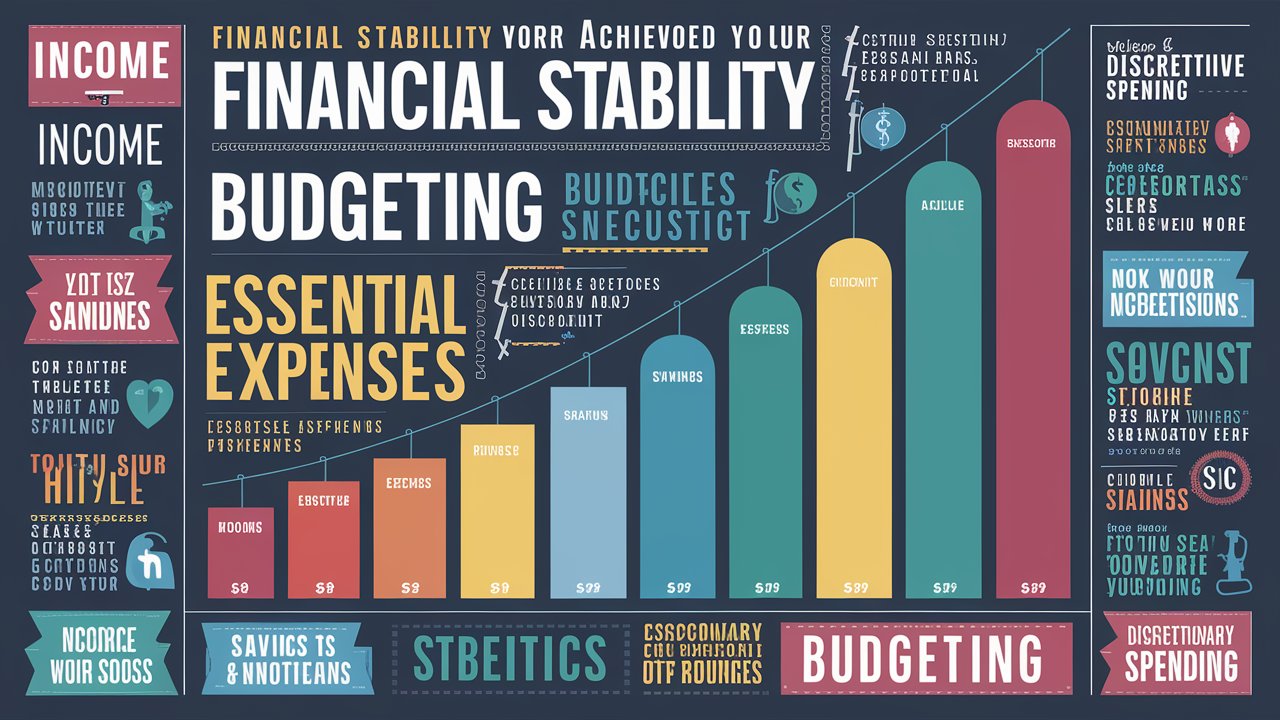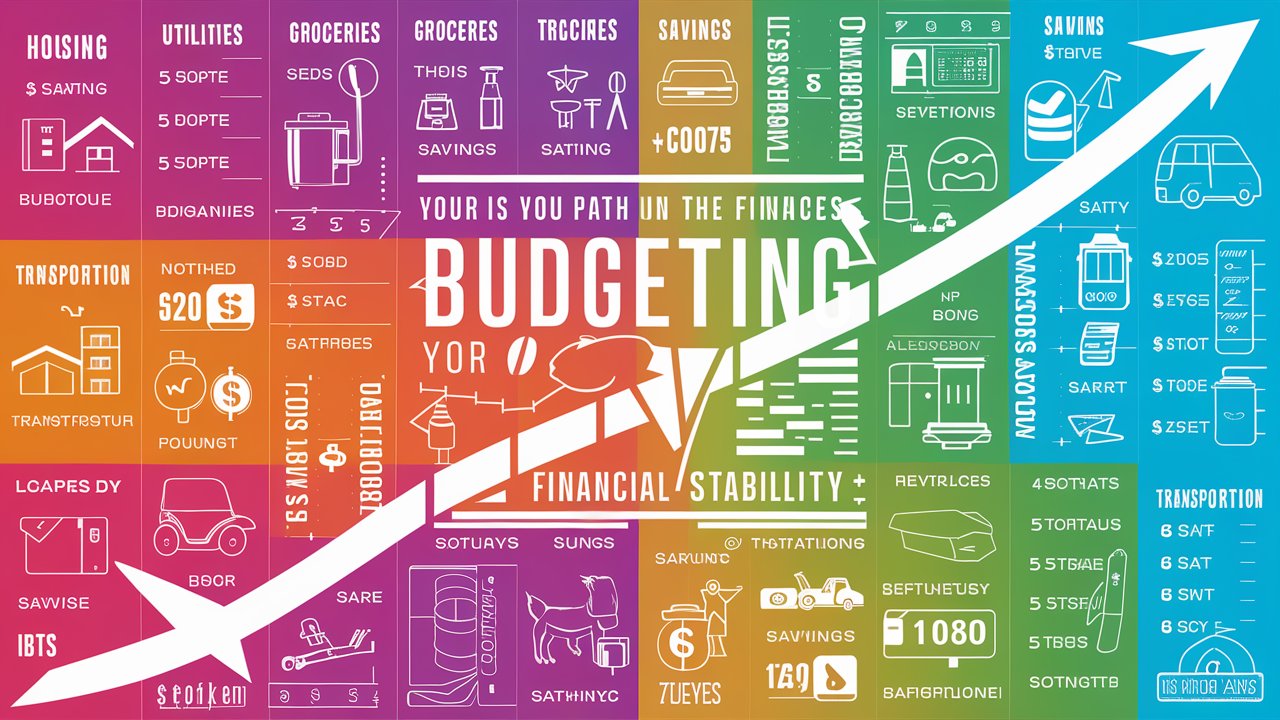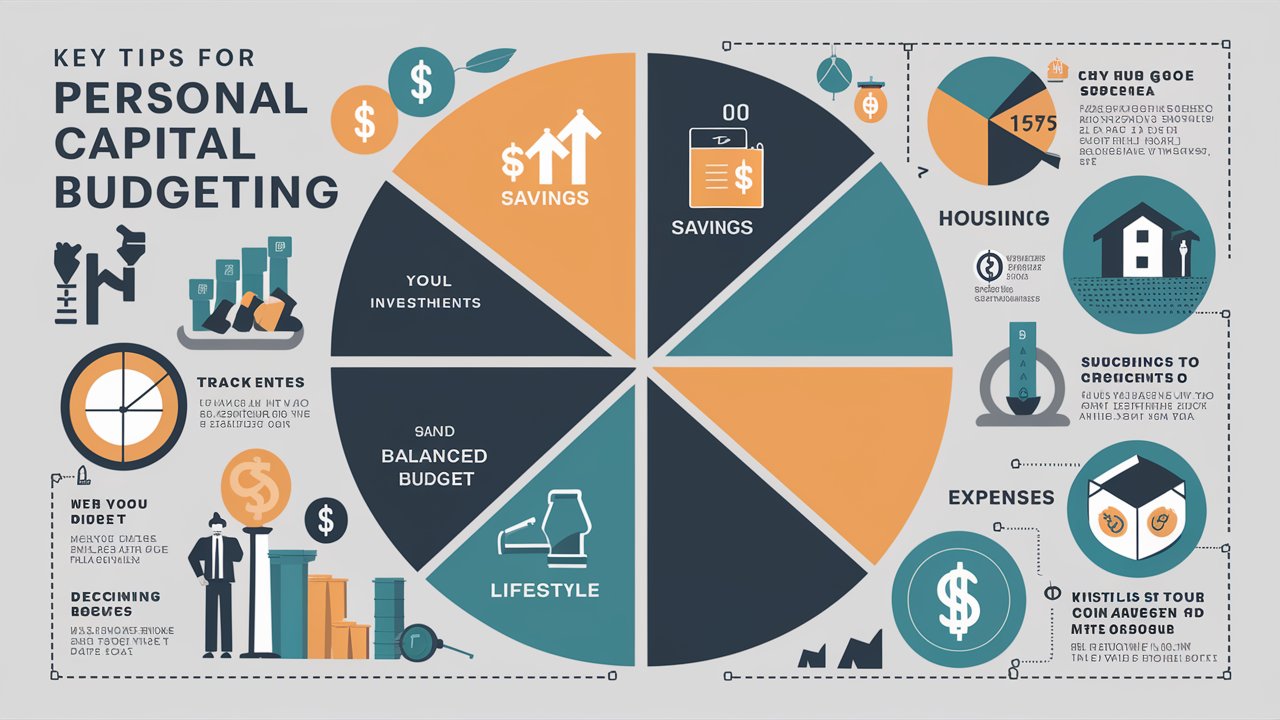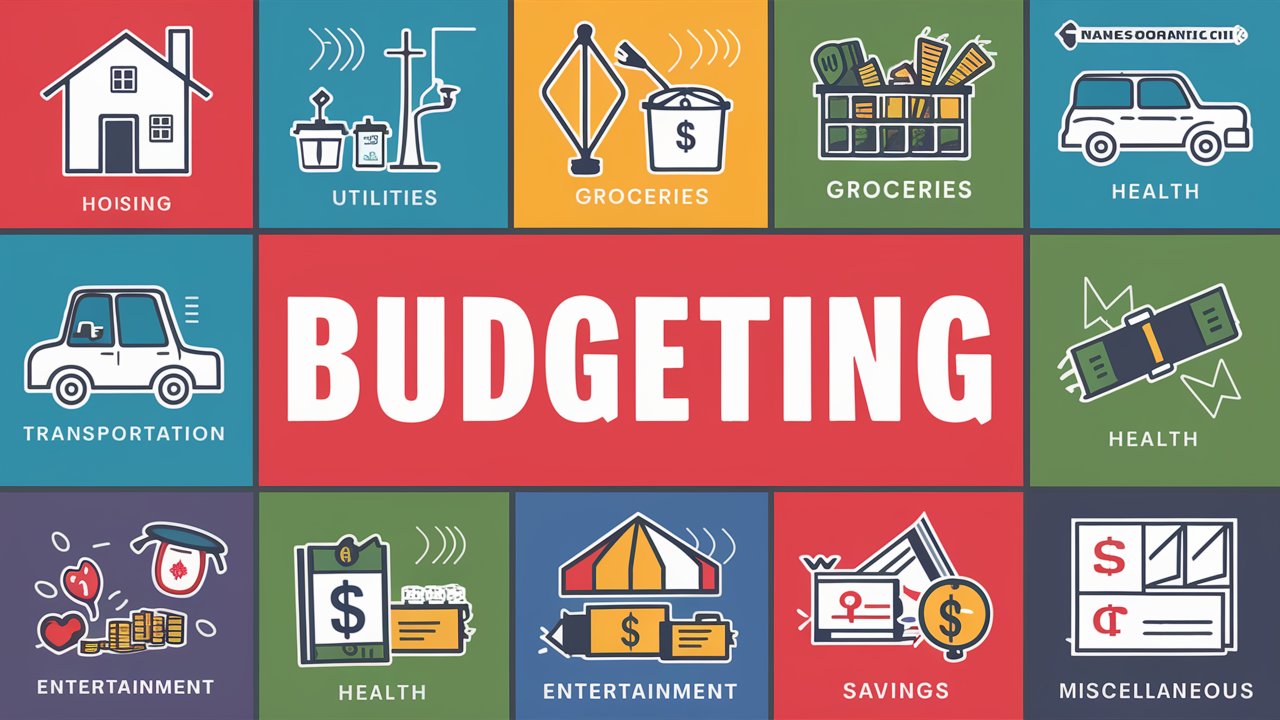Table of Contents
ToggleMastering 7 Key Budgeting Categories for Unstoppable Financial Stability
Budgeting is a cornerstone of financial stability, yet many struggles with how to categorize their expenses effectively. Understanding and mastering budgeting categories can significantly enhance your financial planning, ensuring that you allocate your income wisely and prepare for both expected and unexpected expenses. This guide will delve into essential budgeting categories, providing a comprehensive overview to help you achieve financial success.

Introduction
Creating a budget is akin to drawing a roadmap for your financial journey. Just as a map guides you to your destination, a budget guides you towards financial stability by helping you manage your money efficiently. The process involves dividing your expenses into different categories, each representing a specific area of spending. These categories not only provide clarity on where your money goes but also help you identify areas where you can cut back and save more. In this article, we will explore the key budgeting categories, offering insights on how to use them effectively.
Understanding Budgeting Categories
When setting up a budget, it’s crucial to divide your expenses into categories that reflect your spending habits and financial goals. Budgeting categories serve as the framework for your financial plan, allowing you to allocate funds appropriately and track your expenditures. Here are some essential budgeting categories that can help you manage your finances more effectively:
Housing
Housing typically accounts for the largest portion of most budgets. This category includes rent or mortgage payments, property taxes, homeowners or renters insurance, utilities (such as electricity, water, gas), and maintenance costs. Properly budgeting for housing ensures you can comfortably afford your living situation without compromising other financial obligations.
Transportation
Transportation costs can vary significantly depending on your lifestyle and location. This category encompasses car payments, fuel, insurance, maintenance and repairs, public transportation fares, and other travel-related expenses. Allocating funds for transportation ensures you can get to work, school, and other essential destinations without financial strain.
Food
Food is a non-negotiable expense, making it a crucial budgeting category. This includes groceries, dining out, and any other food-related costs. By tracking your food expenses, you can identify areas where you might be overspending and find ways to reduce costs, such as cooking at home more often or taking advantage of sales and discounts.
Healthcare
Healthcare expenses can be unpredictable but are essential for maintaining your well-being. This category includes health insurance premiums, out-of-pocket medical costs, dental and vision care, and prescription medications. Budgeting for healthcare ensures you can afford necessary treatments and medications without derailing your financial plan.

Insurance
Apart from health insurance, there are various other types of insurance that you might need to budget for, such as life insurance, auto insurance, and home or renters insurance. Including these in your budget helps you prepare for potential risks and protect your financial assets.
Debt Repayment
If you have any form of debt, such as student loans, credit card debt, or personal loans, this category is vital. Allocating funds specifically for debt repayment helps you systematically pay down your balances and reduces the overall interest you pay over time. Prioritizing high-interest debt can accelerate your journey to becoming debt-free.
Savings
Savings should be a top priority in any budget. This category includes your emergency fund, retirement savings, and any other short-term or long-term savings goals. Consistently contributing to your savings ensures you are prepared for unexpected expenses and can achieve your financial objectives.
Entertainment and Recreation
It’s important to budget for fun and leisure activities to maintain a balanced lifestyle. This category includes expenses such as movies, concerts, vacations, hobbies, and other recreational activities. Allocating funds for entertainment allows you to enjoy life without feeling guilty or financially stressed.

Personal Care
Personal care expenses include items and services related to your personal hygiene and well-being, such as toiletries, haircuts, skincare products, and gym memberships. Budgeting for personal care ensures you can maintain your health and appearance without overspending.
Miscellaneous
The miscellaneous category is for any expenses that don’t fit neatly into the other categories. This might include gifts, donations, or any other irregular or unexpected costs. Having a miscellaneous category provides flexibility in your budget to accommodate unforeseen expenses.
Emergency Fund
An emergency fund is a critical component of financial stability. This category is specifically for unexpected expenses, such as car repairs, medical emergencies, or job loss. Building and maintaining an emergency fund ensures you have a financial cushion to fall back on during tough times.
Investments
If you are actively investing, this category is essential. It includes contributions to brokerage accounts, mutual funds, real estate investments, and other investment vehicles. Budgeting for investments helps you grow your wealth and work towards financial independence.

Clothing
Clothing is a necessary expense that can vary greatly depending on your needs and preferences. This category covers everything from everyday wear to special occasion outfits and work attire. By budgeting for clothing, you can ensure you always have appropriate attire without overspending.
Childcare and Education
For those with children, childcare and education expenses can be significant. This category includes daycare, school tuition, extracurricular activities, and college savings. Properly budgeting for these costs ensures your children have access to quality education and care without financial strain.
Home Improvement
Home improvement expenses are for maintaining and enhancing your living space. This includes repairs, renovations, landscaping, and home decor. Budgeting for home improvement ensures your home remains a comfortable and valuable asset.
Gifts and Donations
This category includes money spent on gifts for family and friends as well as charitable donations. Budgeting for gifts and donations allows you to be generous without negatively impacting your financial situation.
Taxes
Taxes are an inevitable part of life, and budgeting for them is crucial. This category includes federal, state, and local taxes, as well as any property or sales taxes you may owe. By setting aside money for taxes, you can avoid the stress of scrambling to pay them when they are due.
Pets
If you have pets, their expenses should be included in your budget. This category covers food, veterinary care, grooming, and other pet-related costs. Budgeting for your pets ensures you can provide them with the care they need without financial strain.
Business Expenses
For those who run a business or have side hustles, business expenses are an important category. This includes costs such as supplies, advertising, professional services, and other business-related expenses. Properly budgeting for your business ensures its financial health and sustainability.
Hobbies
Hobbies and personal interests can bring joy and fulfillment, but they also come with costs. This category includes expenses related to your hobbies, such as equipment, supplies, and memberships. Budgeting for hobbies ensures you can enjoy your interests without overspending.
Subscriptions and Memberships
Many people have various subscriptions and memberships, such as streaming services, magazines, or club memberships. This category helps you keep track of these recurring expenses and evaluate whether they are worth the cost.
Utilities
Utilities are an essential part of maintaining a household. This category includes electricity, water, gas, internet, and phone bills. Budgeting for utilities ensures you can keep your home running smoothly without financial surprises.
Travel
Travel can be a significant expense, whether it’s for work, leisure, or family obligations. This category includes costs such as flights, accommodation, transportation, and meals. By budgeting for travel, you can enjoy trips without the stress of overspending.
Financial Goals
This category encompasses any other financial goals you might have, such as saving for a down payment on a house, starting a business, or funding a major purchase. Including these goals in your budget helps you stay focused and motivated to achieve them.
Conclusion
Budgeting is more than just a financial exercise; it’s a tool that can help you achieve your financial goals and live a more secure and fulfilling life. By understanding and utilizing budgeting categories, you can gain better control over your finances, reduce unnecessary spending, and ensure that you are prepared for both planned and unexpected expenses. Start by identifying the categories that are most relevant to your lifestyle and financial situation, and regularly review and adjust your budget to stay on track. With discipline and careful planning, mastering budgeting categories can lead you to financial stability and success.
FAQs
- What are budgeting categories?Budgeting categories are specific areas of spending that help you organize and manage your finances more effectively. They include housing, transportation, food, healthcare, insurance, and more.
- Why are budgeting categories important?Budgeting categories provide structure to your financial planning, allowing you to allocate funds appropriately, track expenses, and identify areas where you can save money.
- How do I choose the right budgeting categories?Choose categories that reflect your spending habits and financial goals. Common categories include housing, transportation, food, healthcare, and savings, but you should tailor them to your unique situation.
- Can budgeting categories change over time?Yes, your budgeting categories can and should change as your financial situation and goals evolve. Regularly reviewing and adjusting your budget ensures it remains relevant and effective.
- How can I stay disciplined with my budgeting categories?To stay disciplined, track your spending regularly, set realistic financial goals, and adjust your budget as needed. Using budgeting tools and apps can also help you stay on track.
- What should I do if I exceed my budget in a specific category?If you exceed your budget in a specific category, review your spending to identify areas where you can cut back. Adjust your budget to reflect any changes and aim to stay within your limits in the future.
Personal Capital Budgeting Methods 101
For more information regarding Finance Basic you can visit FinancewithAi Channel & Home
Share this:
- Click to share on LinkedIn (Opens in new window)
- Click to share on Reddit (Opens in new window)
- Click to share on Tumblr (Opens in new window)
- Click to share on Pinterest (Opens in new window)
- Click to share on Pocket (Opens in new window)
- Click to share on Telegram (Opens in new window)
- Click to share on Threads (Opens in new window)
- Click to share on WhatsApp (Opens in new window)
- Click to share on Mastodon (Opens in new window)
- Click to share on Nextdoor (Opens in new window)
- Click to share on Bluesky (Opens in new window)
Pingback: Top 5 Budget Planners: The Key to Mastering Your Finances - FINANCE WITH AI
Pingback: 50/30/20 Rule Spreadsheet: Easy Money Management